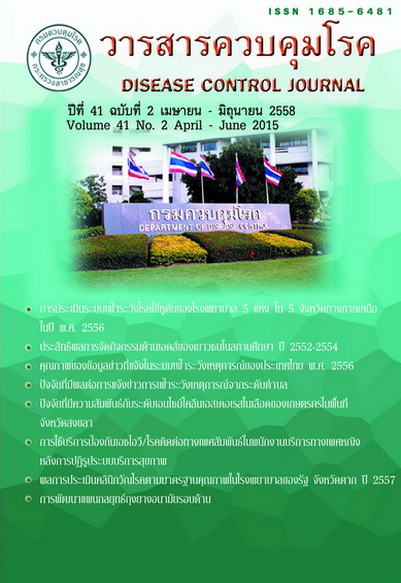Evaluation of surveillance for Streptococcus suis infection in 5 hospitals in 5 provinces in North region, 2013
DOI:
https://doi.org/10.14456/dcj.2015.18Keywords:
Streptococcus suis, infection surveillance system, evaluationAbstract
Streptococcus suis infection was acquired through consumption of uncooked pork or uncooked pork products or exposure to contaminated pigs or pig's blood. A case fatality rate ranged from 5.00 to 20.0096. The Streptococcus suis infection had been determined to report under national disease surveillance system since 2011. Evaluation of surveillance for Streptococcus suis infection was to conduct as a cross sectional quantitative study in 5 hospitals in 5 provinces in North region. The objectives were to examine reporting processes of Streptococcus suis infection in the general hospitals and obstacles of the reporting. Data from medical records that met a case definition were retrieved from January 1 to December 31, 2013. Descriptive analyses were performed by Epi Info. There were 460 cases which were enrolled into the study. Of those 460 cases, 67 cases were compatible with the case definition that were defined as 19 suspected cases, 28 probable cases and 20 confirmed cases. Sensitivity of reporting into the national disease surveillance system was 29.89°/o while predictive positive value showing result for 44.4 5 %. Representativeness of age distribution was similar between cases from medical records and cases from the national disease surveillance. An average for timeliness of reporting was 4.9 days. Nurses at screening stations could be the focal person to detect any suspected cases of Streptococcus suis infection when the cases with exposure history admitted to the hospitals. Training course for nurses to gain knowledge about a natural history of Streptococcus suis infection and epidemiology of the disease could be important process to scale up Streptococcus suis infection surveillance. Laboratory surveillance network should also be strengthening to estimate a true incidence of the disease.
Downloads
References
2. Perch B, Kristjansen P, Skadhauge K, Group R streptococci pathgenic for man. Tow case of miningitis and one fatal case of sepsis. Axta Pathol Microbiol Scacd 1968;74:69-76.
3. Yu H, Jing H, Chen Z, Zheng H, Zhu X, Wang H, et al. Human Streptococcus suis outbreak, Sichuan China. Emerg Infect Dis 2006; 12: 914-20.
4. Pootong p, Boongrid p, Phuaprsdit p, Streptococcus suis miningitis at Ramathibodi Hospital. Ramathibodi Med J 1993;16:203-7.
5. เสาวพักตร์ ฮิ้นจ้อย, ธีรศักดิ์ ชักนำ, ประวิทย์ ชุมเกษียร. ข่าวการเกิดโรคในคนที่ติดต่อมาจากสุกร ในสาธารณรัฐประชาชนจีน. รายงานเฝ้าระวังทางระบาดวิทยาประจำสัปดาห์ 2548;36:502-3.
6. กลุ่มงานพัฒนาระบบและมาตรฐานงานระบาดวิทยา สำนักระบาดวิทยา กรมควบคุมโรค กระทรวงสาธารณสุข. นิยามโรคติดเชื้อประเทศไทย. พิมพ์ครั้งที่ 2. กรุงเทพมหานคร: โรงพิมพ์องค์การรับส่งสินค้าและพัสดุภัณฑ์ (ร.ส.พ.); 2546.
7. Fongcom A, Pruksakorn S, Netsirisawan P, Pongprasert R, Onsibud P. Streptococcus suis infection: a prospective study in northern Thailand. Southeast Asian J Trop Med Public Health 2009;40:511-7.
8. Wangkaew S, Chaiwarith R, Tharavichitkul P, Supparatpinyo K, Streptococcus suis infection: a series of 41 cases from Chiang Mai University Hospital. Journal of Infection 2006;52:455-60.
9. Donsakul K, Dejthevapom C, Witoonpanich R. Streptococcus suis infection: clinical features and diagnostic pitfalls. Southeast Asian J Trop Med Public Health 2003;34:154-8.
10. Suankratay C, Intalapapom P, Nunthapisud P, Arunyingmongkol K, Wilde H. Streptococcus suis meningitis in Thailand. Southeast Asian J Trop Med Public Health. 2004;35:868-76.
11. Vilaichone RK, Vilaichone W, Nunthapisud P, Wilde H. Streptococcus suis infection in Thailand. J Med Assoc Thai 2002;85:S109-17.
12. Kerdsin A, Dejsirilert A, Puangpatra P, Sripakdee S, Chumla K, Boonkerd N, et al. Genotypic profile of Streptococcus suis serotype 2 and clinical features of infection in humans, Thailand. Emerg Infect Dis 2011;17:835-42.
13. Huang YT, Teng LJ, Ho SW, Hsueh PR. Strep-tococcus suis infection. J Microbiol Immunol Infect 2005;38:306-13.
14. Higgins R, Gottschalk M, Mittal K R, Beaudoin M. Streptococcus suis infection in swine. A sixteen month study. Canadian J of veterinary Research 1990;54:170-3.
15. Pathanasophon P, Worarach A, Narongsak W, Yuwapanichsampan S, Nuangmek A, Sakdasirisathapom A, et al. Prevalence of Streptococcus suis in Tonsils of Slaughtered Pigs in Lampang and Phayao Provinces, Thailand, 2009-2010. J Trop Med Parasitol 2013; 36:8-14.
Downloads
Published
How to Cite
Issue
Section
License
Articles published in the Disease Control Journal are considered as academic work, research or analysis of the personal opinion of the authors, not the opinion of the Thailand Department of Disease Control or editorial team. The authors must be responsible for their articles.






